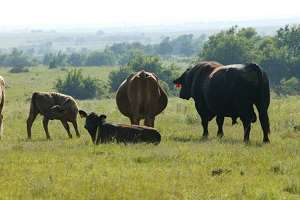Kansas State Beef Cattle Specialist Dr. Bob Weaber gets a lot of questions from cattle producers about what kind of bulls they ought to be buying. Farm Director Ron Hays talks with Weaber about how he responds when he is approached for this kind of advice. He says he usually turns the table on the producer and begins asking his own questions.

“I usually put three questions to them,” Weaber said, “Depending on what your response is there, it has an influence on what direction of genetics you might go.”
The three questions Dr. Weaber typically puts to producers are 1.) how do you sell calves, what is your marketing endpoint; 2.) how do you generate replacement heifers, raise your own or buy them; and 3.) where are you at today with the cattle you run on your operation, what genetics make up your herd currently - are they mostly British, continental, bos indicus or some combination of those?
“Whatever the case is,” Weaber said, “trying to figure out a little bit in terms of breed complementarity, what direction we might head as we think about combining optimality in terms of maternal and growth and carcass traits to produce really what I like to call environmentally adapted cows.”
Click here to see more...